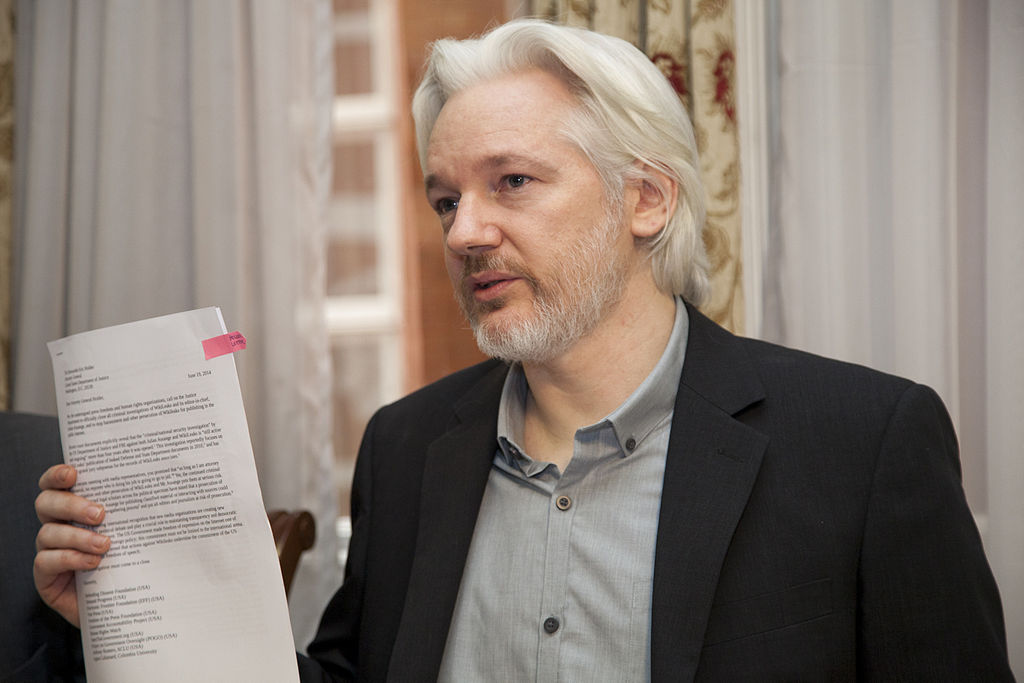Originally published at MintPress News.
WASHINGTON — The FBI and Justice Department filed a massive court document earlier this year that defends their refusal to release files from their WikiLeaks investigations.
The 113-page filing, dated March 15, contains dozens of pages of court cases which support their argument that they can’t be forced to release any details about their investigations of WikiLeaks, U.S. Army whistleblower Chelsea Manning, or what the government calls Manning’s “alleged civilian co-conspirators,” which are likely to include figures like WikiLeaks founder Julian Assange.
WikiLeaks shared the document in a tweet on May 3:
FBI has filed a 113 page court doc on why the pending prosecution of WikiLeaks must be kept a state secret https://t.co/13RHWuDDlZ #WPFD2016
— WikiLeaks (@wikileaks) May 3, 2016
In 2010, while serving as an U.S. Army intelligence officer, Manning leaked thousands of files to WikiLeaks, including “Collateral Murder,” a video showing two U.S. army helicopters killing two Reuters employees and a family of civilians who stopped to assist them. Manning also leaked a massive cache of diplomatic cables, files from the Guantanamo Bay detention center in Cuba, and reports from the Afghanistan and Iraq wars. In 2013, she was sentenced to 35 years in a military prison, which she’s currently serving at Ft. Leavenworth, Kansas.
Fearing prosecution by the U.S., Assange obtained asylum from Ecuador in 2012. He’s been living in the Ecuadorean Embassy in London for the past four years. In February, a United Nations panel declared his confinement to be “arbitrary detention” and urged his immediate release.
The motion from the DOJ and FBI represents a response to a lawsuit pertaining to a 2014 Freedom of Information Act request by Manning that demanded access to “[d]ocuments, papers, reports, letters, memoranda, films, electronic data, photographs, audio and video recordings of or pertaining to investigation” conducted by the FBI into her disclosure of both “classified and sensitive but unclassified information” to WikiLeaks, as well as any documents that pertain to her allies at the international NGO.
Manning’s legal team launched the suit in December after the government denied her request. According toThe Associated Press, “The FBI denied Manning’s 2014 request to release the records under the Freedom of Information Act, claiming they may be relevant to a pending or prospective law-enforcement proceeding,” making them exempt under clause 7(A) of the act.
But, as the AP reported, Manning’s lawyers argue that “her 2013 court martial should render that exemption moot, since any further prosecution of her in federal court would constitute double jeopardy, barred by the Constitution.”
In the government’s filing from March, the FBI and DOJ ask the court to dismiss this argument, and the lawsuit itself, by arguing that the investigation into WikiLeaks is still ongoing, despite Manning’s imprisonment. They argue that the FOIA was specifically designed to allow government agencies to avoid this kind of scrutiny:
Manning’s request is a quintessential example of an improper attempt to use FOIA to force the government to open its investigative files to public inspection.
Quoting from the Supreme Court case Baldridge v. Shapiro, which challenged the confidentiality rules of the Census Bureau, the lawyers argue “that public disclosure is not always in the public interest.”
Last year, the AP reported that the federal government has denied a record-breaking number of requestsduring the Obama administration. This lack of transparency and frequent persecution of whistleblowers led Reporters Without Borders to rank the U.S. at 41 out of 180 countries in its annual World Press Freedom Index.
Manning’s had better luck with a February FOIA request which revealed a slideshow from the National Insider Threat Task Force that trains government officials to spot future whistleblowers. The slideshow uses the Manning case as an example, but rather than citing her principled stand on human rights and freedom of information, it refers to her as “disgruntled” and suggests she’s “obsessively” focused on advocating for her own human rights as a transgender woman and prisoner.
In a March 18 editorial for The Guardian, Manning argued that the government should form a “Transparency and Accountability Task Force.” “It would encourage dissent. It would allow dirty laundry, drama and corruption to be aired out rather than allowed to fester,” she wrote.
“We could all – citizens, the government and its employees – benefit from that.”
